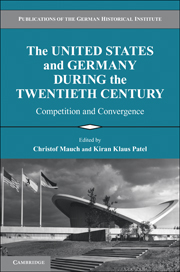Book contents
- Frontmatter
- Contents
- Contributors
- Acknowledgments
- 1 Modernities: Competition versus Convergence
- 2 Empires: Might and Myopia
- 3 Religion: Belief and Power
- 4 Law: Constitutionalism and Culture
- 5 Welfare: Entitlement and Exclusion
- 6 Immigration: Myth versus Struggles
- 7 Masses: Mobilization versus Manipulation
- 8 Market: Consumption and Commerce
- 9 Authority: Schools and Military
- 10 Gender: Equality and Differences
- 11 Environment: Conservation versus Exploitation
- 12 Film and Television
- 13 Education: Universities and Research
- 14 Media: Government versus Market
- Index
2 - Empires: Might and Myopia
Published online by Cambridge University Press: 12 October 2018
- Frontmatter
- Contents
- Contributors
- Acknowledgments
- 1 Modernities: Competition versus Convergence
- 2 Empires: Might and Myopia
- 3 Religion: Belief and Power
- 4 Law: Constitutionalism and Culture
- 5 Welfare: Entitlement and Exclusion
- 6 Immigration: Myth versus Struggles
- 7 Masses: Mobilization versus Manipulation
- 8 Market: Consumption and Commerce
- 9 Authority: Schools and Military
- 10 Gender: Equality and Differences
- 11 Environment: Conservation versus Exploitation
- 12 Film and Television
- 13 Education: Universities and Research
- 14 Media: Government versus Market
- Index
Summary
After the tragic events of September 11, 2001, and the disordered world they seemed to imply, the United States sought to secure itself by turning to empire. For the first time since 1898, arguments for empire and its benefits were being made in the United States. The embrace of empire concerned both “homeland” security, as it was called, and foreign adventures. Yet, after a few years, the public turned against the worst of the imperial moment, and Barack Obama was elected president in 2008, not least on the basis of his offer of a revived republic at home and an alternative to empire abroad – of a world of global connection, cosmopolitanism, and constitutionalism. This moment invites a reconsideration of empire in the twentieth century, and the central roles Germany and the United States have played in the history of nations extending themselves as empires.
At the beginning of the twentieth century, the United States and Germany were the quintessential modern nations of the transatlantic world. Both had been re-founded in mid-nineteenth-century wars: the American Civil War and the Prussian wars of unification, respectively. What is more, they had been originally founded and then re-founded as nation-states, as self-conscious alternatives to empires as normality. With their significant transnational interconnections, both nations might have become paragons of internationalism. Yet, at crucial moments in their history, they turned global interconnections in the direction of embracing empire.
Empire is, of course, a rather elastic concept. Commonplace templates of empire fit the history of neither country. Some reject altogether the moniker “empire” or “imperial nation” for the United States because Americans have repeatedly denied their imperial ambitions. By contrast, extraordinary attention has been focused on the diminutive, late-nineteenth-century German Empire, and farreaching conclusions have been drawn from Germany's imperial ventures because of the literally fantastic, popular ambitions associated with its Weltpolitik. By the same token, Nazi rule – the assertion of imperial and racial primacy – has been recognized only slowly as Nazi empire. Many historians are still more comfortable seeing the National Socialist empire as a type of regime all its own or as manifestation of “totalitarianism.” They see it more as an abomination than as a political formation that could and should be compared to others, lest it taints them by the act of comparison.
- Type
- Chapter
- Information
- The United States and Germany during the Twentieth Centurycompetition and convergence, pp. 13 - 31Publisher: Cambridge University PressPrint publication year: 2010

